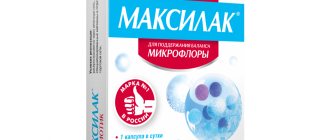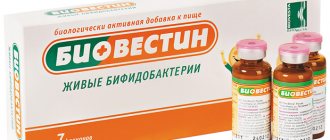What is the medicine Acipol for?
Indications for use can be found in the instructions. But this does not mean that a person can determine for himself the advisability of using the drug. Before your appointment, it is recommended to consult with a specialist who can prescribe an individual treatment regimen.
The medication is prescribed for various types of inflammatory reactions in the intestinal area. Such reactions include: dysentery, salmonellosis, adenoviral infections. Acipol is also prescribed for colitis. This medicine is used to treat dysbiosis.
Other indications include the need for long-term antibacterial treatment. The medicine is often used by people with weak immune systems. Acipol has proven itself well in correcting the condition of babies who were born prematurely. The drug is given to correct the gastrointestinal tract. It is in infancy that children often experience gas formation and pain in the abdomen.
Acipol Baby: instructions for use
Ingredients: sunflower oil filler, lactobacilli Lactobacillus rhamnosus ATCC 53103, bifidobacteria Bifidobacterium longum CECT 7894, anti-caking agent silicon dioxide (E 551), antioxidant DL-alpha tocopherol acetate.
| Content of active ingredients in 1 serving (5 drops = 0.25 ml): | |
| Lactobacilli Lactobacillus rhamnosus ATCC 53103 | 1x109 CFU |
| Bifidobacterium Bifidobacterium longum CECT 7894 | 5x108 CFU |
Nutritional and energy value of 1 dose:
fats – 0.21 g, proteins – 0.01 g, carbohydrates – 0.01 g, including sugars – 0 g; energy value – 1.94 kcal / 8.14 kJ 8.14 kJ / 1.94 kcal.
Bifidobacteria and lactic acid bacteria are natural inhabitants of the intestinal tract, part of the normal intestinal flora. They are necessary for digestion processes and the formation of a “protective barrier” of the body to support the child’s health.
Currently, qualitative and quantitative changes in the state of the intestinal microflora are common causes of disturbances in the digestive process, the functioning of the immune system, and atopic conditions in children. The balance of normal intestinal microflora is an important factor in the body's immunological barrier.
Disturbances in the balance of intestinal microflora in babies can manifest as disturbances in stool, appetite, and increased gas formation (colic).
The causes of microbial imbalance in the intestines (dysbacteriosis) may be the absence or cessation of breastfeeding, changes in diet (introduction of complementary foods), and the need to take drugs that suppress normal microflora (including antibiotics). In this connection, it may be necessary to take a probiotic complex containing beneficial probiotic bacteria.
Probiotic microorganisms Lactobacillus rhamnosus and Bifidobacterium longum are representatives of the normal microflora of the human intestine, antagonists of pathogenic and opportunistic microorganisms, have a corrective effect on the intestinal microflora (in conditions of dysbacteriosis of various origins, after antibiotic therapy), and contribute to increasing the overall resistance of the child’s body.
According to scientific research, the immunoregulatory effect of probiotics is in demand for intestinal infections, in frequently ill children, for inflammatory bowel diseases, for the correction of food allergy conditions and atopic skin reactions.
Complexes containing lactobacilli and bifidobacteria (including Lactobacillus rhamnosus and Bifidobacterium longum), according to a number of studies, are characterized by good tolerability, a favorable safety profile, and the ability to reduce the risk of developing functional disorders of the gastrointestinal tract (diarrhea, constipation, abdominal discomfort, colic). A significant number of studies have shown the beneficial effects of probiotics for antibiotic-associated diarrhea.
"Acipol® Baby" is a probiotic for children from the first days of life, containing a complex of beneficial bacteria that help reduce the risk of dysbiosis in infants and normalize intestinal microflora from birth.
The action of "Acipol® Baby" is due to the properties of the active components of Lactobacillus Lactobacillus rhamnosus and Bifidobacterium Bifidobacterium longum (according to scientific data and the results of clinical studies):
Lactobacillus Lactobacillus rhamnosus contributes to
- synthesis of compounds that inhibit the growth of pathogenic microorganisms;
- the formation of lactic acid, and the acidic environment created in this way has a beneficial effect on the development of bifidobacteria;
- reducing the risk of developing microflora imbalance and antibiotic-associated diarrhea while taking antibiotics;
- increasing nonspecific resistance of the body;
- a significant reduction in the manifestations of atopic dermatitis (including in infants) and the frequency of development of allergic conditions;
- reducing the incidence of infectious diseases, including acute respiratory diseases;
- increasing the activity of phagocytes and increasing the level of immunoglobulins (IgA);
- lactobacilli have an immunomodulatory effect and are able to reduce the severity of inflammation in the intestinal wall;
- against the background of their use, reducing the duration of acute diarrhea of infectious (including rotavirus) origin;
- against the background of their use, a decrease in the number of episodes of intestinal colic was recorded;
- against the background of their use, a positive effect in reducing the incidence of caries and maintaining oral health in children.
Bifidobacterium longum
Along with other representatives of the normal intestinal flora, bifidobacteria:
- Take an active part in digestion and absorption;
- Promote the processes of enzymatic digestion of food;
- Promote normal intestinal motility and evacuation of intestinal contents;
- Promotes the synthesis of vitamins in the intestines, better absorption of nutrients;
- They support normal processes of parietal digestion and suppress the growth of pathogenic microflora.
Acipol® Baby does not contain lactose, so it can be used to normalize the intestinal microflora of children with lactase deficiency.
Application area:
It is recommended as a biologically active food supplement - an additional source of probiotic microorganisms (live lactobacilli and bifidobacteria) that help improve intestinal function, restore the balance of its microflora, strengthen the immune system, and accelerate the adaptation processes of the child’s body.
Beneficial bacteria in the composition of Acipol® Baby help eliminate the manifestations of dysbacteriosis in newborns and infants.
Probiotic bacteria in the composition of Acipol Malysh are widely used for the production of food dairy products and baby food all over the world. They have not been genetically modified and are considered safe.
Recommendations for use:
For young children from 0 years old, 5 drops (0.25 ml) per day with meals.
Duration of treatment – 2 weeks.
Before use, the bottle must be shaken to ensure even mixing of the probiotics with the oil.
For ease of dosing, use the included dosing dropper.
The required number of drops can be mixed with milk (temperature not higher than 370 C).
Do not mix with hot liquids or food.
Contraindications:
Individual intolerance to components.
Before use, you should consult your pediatrician.
Description:
Oil suspension. There may be visually noticeable particles of probiotic substance.
Storage conditions:
Store in original closed packaging, away from direct sunlight, out of reach of children at a temperature not exceeding 25 °C.
Store an opened bottle for no more than 21 days at a temperature not exceeding 25 °C.
Do not freeze.
Release form:
4.5 ml bottles with a dosing dropper.
Sales to the public through pharmacy chains and specialized stores, departments of retail chains.
Shelf life: 2 years from the date of manufacture.
Certificate of state registration:
Manufacturer : SINCROFARM SL, C/ Mercuri 42-48 – Pol. Ind. Almeda 08940 – Cornellà del Llobregat- Barcelona, Spain, for AB-Biotics, SA, Spain.
Importer/Organization receiving consumer complaints:
OTCPharm JSC, Russia, 123112, Moscow, st. Testovskaya, 10, fl. 12, room II, room 29, tel., www.otcpharm.ru
How to use the medicine
Only a specialist can establish a drug treatment regimen. Treatment options depend on the severity of the problem and how the disease progresses. The capsule does not need to be cracked, but swallowed whole and washed down with plenty of drinking water.
If the patient has an acute intestinal disease, then you need to drink 4 capsules per day 25 minutes before meals. The average duration of the treatment course is a week. It is not recommended to take longer than 10 days, while other probiotics are used for a long time. This is a significant advantage of the composition.
Patients claim that the capsules are very convenient and easy to take, they are not large in size.
Acipol Active Suspension, 10 pcs, 10 ml, for oral administration
Pharmacological properties
The action of "Acipol Active" is due to the properties of the active components included in the composition, which enhance and complement each other's action (according to scientific data).
1. Lactobacilli (Lactobacillus rhamnosus)
According to the results of clinical studies of the use of Lactobacillus, it was shown:
- reducing the risk of developing microflora imbalance, including after taking drugs and medications that cause unfavorable changes in the qualitative or quantitative composition of the microbiocenosis of the gastrointestinal tract; against the background of stress and errors in the diet;
- reduction in the frequency of colds;
- increased nonspecific resistance of the body.
What are the benefits of Lactobacillus (Lactobacillus rhamnosus)?
-produce metabolites that selectively suppress the growth of pathogenic microflora;
- have an immunomodulatory effect.
INTERESTING: one study showed a significant decrease in body weight and fat mass when taking Lactobacillus rhamnosus and a prebiotic.
Lactobacilli promote the formation of lactic acid, and the acidic environment created in this way has a beneficial effect on the development of bifidobacteria, which are also present in the Acipol Active suspension;
2. Bifidobacterium (Bifidobacterium longum)
According to the results of clinical studies of the use of Bifidobacteria, it was shown:
- contribute to the normalization of the processes of enzymatic digestion of food, peristalsis and evacuation of intestinal contents;
- along with other representatives of the normal intestinal flora, they take an active part in digestion and absorption.
What are the benefits of Bifidobacterium longum?
The presence of a sufficient number of bifidobacteria in the intestines and the normal state (BALANCE) of the intestinal microflora contributes to the synthesis of vitamins in the intestines, better absorption of food components and optimization of metabolic processes in the body.
A deficiency of bifidobacteria in the intestine can lead to gastrointestinal dysfunction.
Bifidobacteria support normal processes of parietal digestion in the intestine.
It is the complexes containing lactobacilli and bifidobacteria (including Lactobacillus rhamnosus and Bifidobacterium longum), according to a number of studies, that are characterized by good tolerability, a favorable safety profile, and the ability to reduce the risk of developing functional disorders of the gastrointestinal tract. An important property of the probiotics Lactobacillus rhamnosus and Bifidobacterium longum is their ability to attach to the intestinal epithelium, thereby ensuring and strengthening its barrier functions, as well as supporting immunity.
3. Inulin
Inulin is a prebiotic, found in many plants. It serves as a food basis for the growth and reproduction of representatives of normal intestinal microflora (probiotics). Inulin not only promotes the growth and reproduction of its own beneficial intestinal microflora, but also stimulates intestinal motor activity, peristalsis, and optimization of the digestion process.
Clinical studies have shown that inulin stimulates the growth and activity of bifidobacteria and lactobacilli, which helps maintain the normal composition of the microbiota. One of the main features of the substance is that it enters the intestines almost unchanged, where it becomes a breeding ground for bifidobacteria and lactobacilli.
Inulin affects lipid metabolism, which helps reduce the risk of developing cardiovascular diseases and diabetes.
4. Zinc
It is part of the main enzymes and participates in various biochemical reactions; in the processes of synthesis and breakdown of carbohydrates, proteins, fats, nucleic acids, in the stabilization of cell membranes, has immunomodulatory properties, and is necessary for repair (healing) processes.
How to take Acipol for children
Children from 3 months to 3 years are prescribed 1 tablet per day. The contents of the capsule must be dissolved in water or milk. Some parents mix the powder with food. You can take the medicine again after 48 hours.
A child from 3 years of age is prescribed 3-4 capsules per day, preferably 30 minutes before meals. The medicine has many positive reviews for constipation in children. The composition of the drug is completely safe, has no toxic effect, and is perfectly absorbed by the body.
Drops Acipol Baby
> References
Advantages
*
- Associated with an imbalance of intestinal microflora (see leaflet).
Symptoms
**
— Atopy is one of the most common types of dermatosis, the manifestation of which is inflammation of the skin associated with an allergic reaction
Composition and effects
1
— Elazab N. et al. Probiotic Administration in Early Life, Atopy, and Asthma: A Meta-analysis of Clinical Trials. PEDIATRICS Volume 132, Number 3, September 2013
2
— Elazab N. et al. Probiotic Administration in Early Life, Atopy, and Asthma: A Meta-analysis of Clinical Trials. PEDIATRICS Volume 132, Number 3, September 2013; Kalliomaki M, Salminen S, Arvilommi H, Kero P, Koskinen P, Isolauri E. Probiotics in primary prevention of atopic disease: a randomized placebo-controlled trial. Lancet 2001; 357:1076-9.
3
-Synbiotic in the management of infantile colic: a randomized controlled trial. Kianifar H1, Ahanchian H, Grover Z, Jafari S et al. J Paediatr Child Health. 2014 Oct;50(10):801-5. doi: 10.1111/jpc.12640. Epub 2014 Jun 24.
4
-L Lactobacillus GG in the prevention of antibiotic associated diarrhea in children Jon A. Vanderhoof, MD, David B. Whitney. THE JOURNAL OF PEDIATRICS VANDERHOOF ET AL VOLUME 135, NUMBER 5.
5
-Lactobacillus rhamnosus GG Supplementation for Preventing Respiratory Infections in Children: A Meta-analysis of Randomized, Placebo-controlled Trials. SHAN LIU, PENGWEI HU. INDIAN PEDIATRICS. VOLUME 50, APRIL 16, 2013; Elazab N. et al. Probiotic Administration in Early Life, Atopy, and Asthma: A Meta-analysis of Clinical Trials. PEDIATRICS Volume 132, Number 3, September 2013
Situations of use
Disorders of the intestinal microflora in a baby
1.
Kato, K et al. Changes in the composition of intestinal bifidobacteria species associated with age // Nast. Microbiol. . – 2021. – T. 74. – No. 8. – pp. 987-995
2.
Avershina E. et al. Continuity and correlation of the network of bifidobacteria in a large unselected cohort of mothers and their children // Applied and environmental microbiology. – 2013. – T. 79. – No. 2. – pp. 497-507.
3.
Martin R. et al. Early life events, including mode and type of feeding, kinship, and gender, that shape the developing gut microbiota // Public Library of Science One - 2021. - Vol. 11. - No. 6. – P. e0158498.
4.
Dubois N.E., Gregory K.E. Characteristics of the intestinal microbiota in intestinal colic: results based on an integrative review of the literature. Biological Research for Nurses. - 2021. - T. 18. - No. 3. - pp. 307-315.
5.
Zakharova I. N. et al. Infantile intestinal colic: a modern view of the problem // Cons. Med. Pediatrics. – 2014. – No. 4. – pp. 46-53.
6.
Milani S et al. The first microbial colonizers of the human intestine: composition, activity and consequences for the health of the intestinal microbiota of infants // Review of Microbiology and Molecular Biology. – 2021. – T. 81. – No. 4. – P. e00036-17.
7.
Koppen IJN et al. Pediatric Rome IV criteria: What's new? // Expert review of gestroenterology and hepatology. – 2017. – T. 11. – No. 3. – pp. 193-201.
8.
Belaiche M. et al. Multiple functional gastrointestinal disorders are common in formula-fed infants and reduce their quality of life / Acta Paediatrica. – 2021. – T. 107. – No. 7. – pp. 1276-1282.
Indications for the drug Acipol®
Dysbacteriosis and conditions leading to its development:
acute intestinal infections (including dysentery, salmonellosis, rotavirus gastroenteritis);
chronic colitis, enterocolitis of infectious and non-infectious origin;
long-term antibacterial therapy.
Dysbacteriosis and weight loss associated with:
active antibiotic therapy for purulent-septic diseases in infants;
chronic, protracted, recurrent pathologies of the respiratory system (bronchitis, pneumonia, including pneumocystis);
atopic dermatitis and other allergic manifestations.
Prevention of dysbacteriosis:
increasing the overall resistance of the body.



